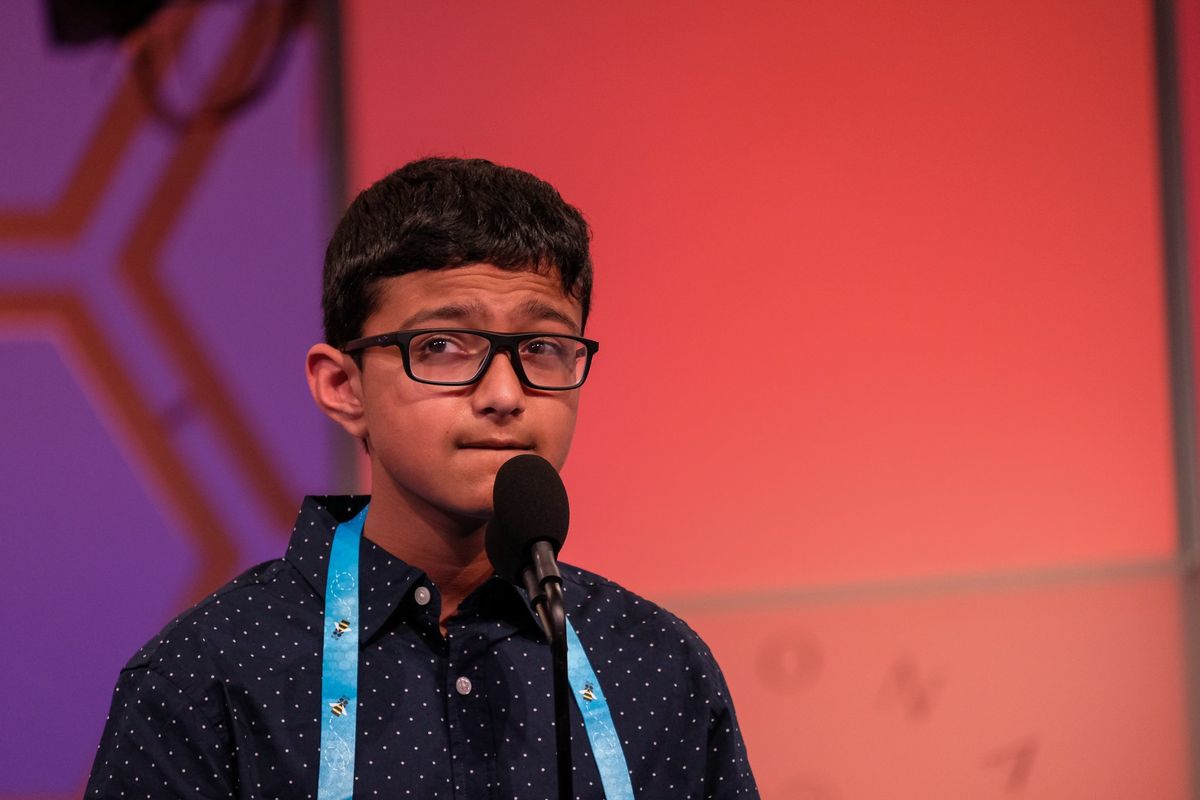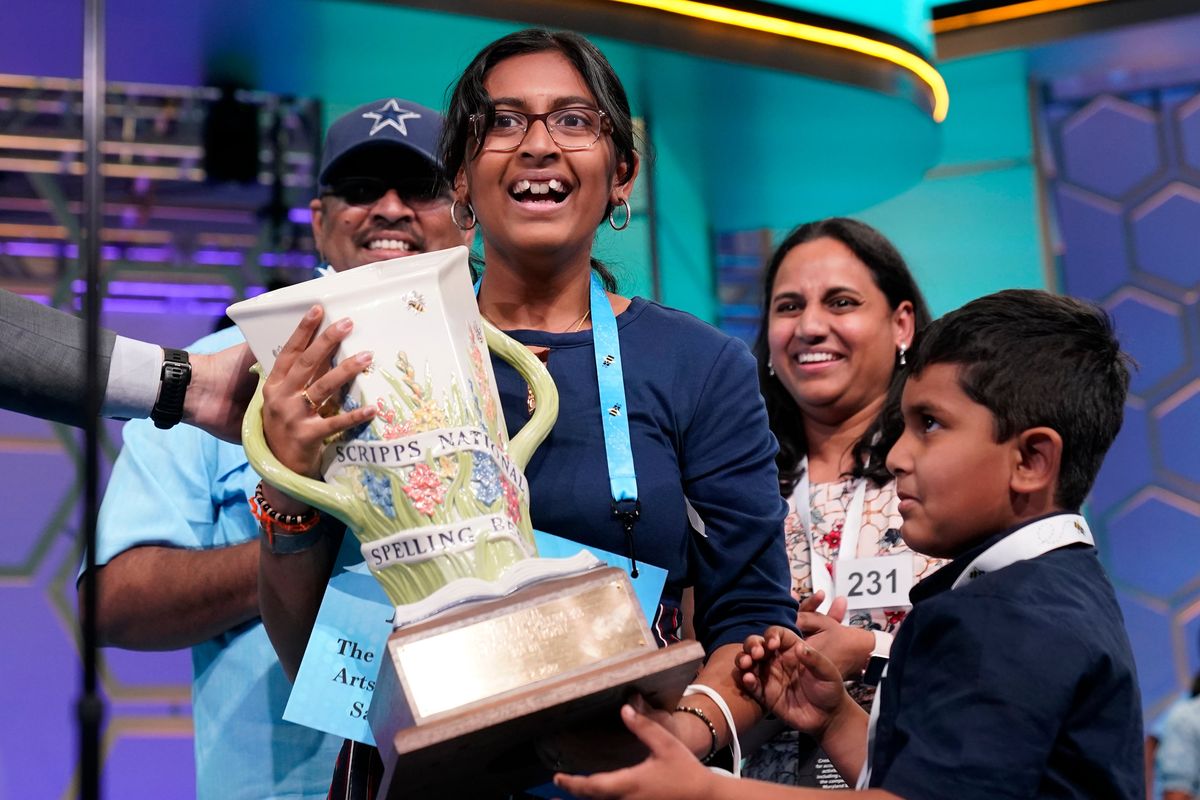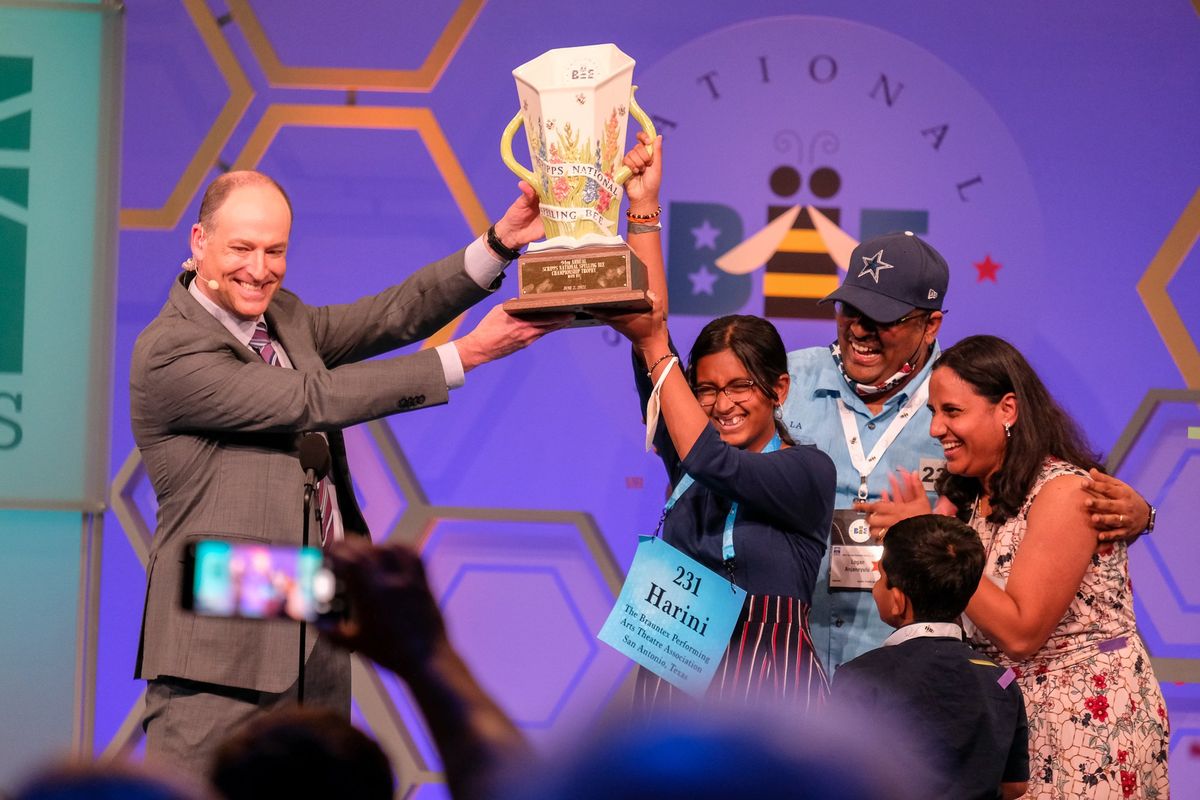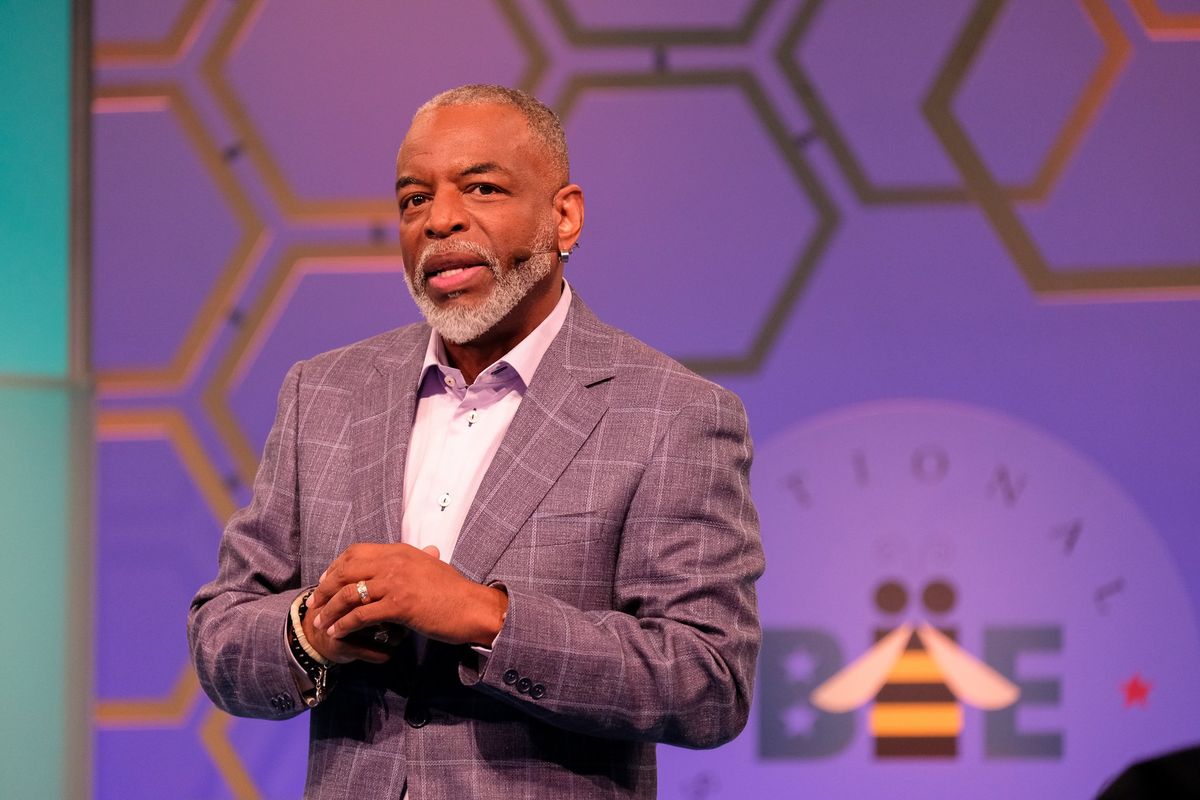Washington’s Saharsh Vuppala places fourth in revamped National Spelling Bee that focuses on far more than memorization
Saharsh Vuppala of Bellevue pauses before spelling a word at the Scripps National Spelling Bee finals on Thursday at National Harbor, Md. The 13-year-old finished fourth, the best performance by a Washingtonian since 1990. (Orion Donovan-Smith, The Spokesman-Review)Buy a print of this photo
NATIONAL HARBOR, Md. – A 13-year-old from Bellevue placed fourth in the 2022 Scripps National Spelling Bee on Thursday, the best performance by a speller from Washington in more than three decades, on a night that ended with the competition’s first “spell-off.”
Saharsh Vuppala, an eighth-grader at Annie Wright Middle School in Tacoma, correctly spelled “Clitocybe” – a genus of mushrooms – in the first round of the finals to advance to a multiple-choice stage that required spellers to identify a word’s meaning. That vocabulary round, which knocked out half of the eight contestants still standing, was part of an increased emphasis on not only spelling words, but defining them.
His coach, Scott Remer, said before the finals he expected the vocabulary round to be the biggest challenge for Vuppala, but the teenager correctly identified the meaning of “encomium” – a formal expression of high praise – to advance to another spelling round before missing the final “L” at the end of “phenocoll,” a chemical used as a painkiller.
Harini Logan of San Antonio emerged victorious after correctly spelling 21 words in the “spell-off,” a 90-second lightning round, breaking a tie after Logan and runner-up Vikram Raju of Denver each misspelled words in the final four rounds.
Harini Logan of San Antonio, 14, celebrates with her family after winning the Scripps National Spelling Bee on June 2, 2022, at National Harbor, Maryland. (Orion Donovan-Smith, The Spokesman-Review)Buy a print of this photo
The top two finishers’ unexpected struggles began when Raju misspelled “Senijextee,” one of several alternate spellings of Sinixt, an Indigenous people from modern-day Washington and British Columbia who are one of the 12 bands of the Colville Confederated Tribes. Spellers rely on a word’s origin to discern its spelling, but the Bee’s pronouncers told Raju the Merriam-Webster Dictionary listed no origin for Senijextee, which comes from a Salish dialect.
Shelly Boyd, an activist who along with other Sinixt people successfully fought to gain recognition in Canada after the Canadian government declared them extinct, explained that Senijextee is just one of numerous ways her people’s name – more accurately spelled using the International Phonetic Alphabet as “Sn̓ʕay̓ckstx” – has been transliterated into English.
“That poor kid,” Boyd said after the Bee ended. “They can’t win on that. There are about 12 ways to spell our name.”
Vuppala, who finished in a tie for 51st place as a fifth-grader in the 2019 Bee, placed higher than any Washingtonian since Amy Marie Dimak of Seattle triumphed in 1990 by spelling “fibranne,” a type of fabric made from rayon.
According to Bee organizers, no speller from Washington had made it to the finals since at least 2016.
The Bee’s winner earns $50,000. The runner-up receives $25,000 and Vuppala will win $10,000 for finishing fourth.
Thirteen finalists began the night’s competition, but the vocabulary round – added in 2021 to test increasingly sophisticated spellers – tripped up some of the favorites to win the event.
Remer – who coached three of the 13 finalists, including Raju – said the new emphasis on word meanings makes it harder to give contestants a balanced set of questions and gives an advantage to older spellers who have been exposed to more words in context over time.
“It’s sort of a spelling and vocab bee now; it’s not really a spelling bee,” said Remer, who was a finalist in the 2008 Bee and has since authored multiple books on the competition. “I just think that it sort of does the competition a disservice.”
Another downside to the vocabulary round was exposed when Logan was initially eliminated for misidentifying the meaning of “pullulation” – meaning either “to swarm” or “to breed” – before the judges determined the answer she gave could also be correct.
Vuppala’s twin sister, Deetya, was also eliminated by a vocabulary round in Thursday’s semifinals without misspelling a single word. In a taped segment shown during the program, Vuppala said it was hard not having her in the finals with him.
“It feels really great to be in the finals of the Bee, but I’m also really sad my sister isn’t there,” he said. “I’m representing Washington and I’m also representing me and my sister.”
Their mother, Mayura Vuchuru, said Saharsh and Deetya supported and challenged each other to become two of the nation’s most elite spellers.
“It’s hard for Deetya, because she worked hard and she is equally capable,” Vuchuru said. “Sometimes it’s just luck, too, in the word you get.”
Shalini Shankar, a professor of anthropology at Northwestern University and author of “Beeline: What Spelling Bees Reveal About Generation Z’s New Path to Success,” said the competition has become more sophisticated in recent years as more spellers’ families have hired coaches like Remer.
“I think that the most interesting thing, hands down, has been the greater proliferation of coaching and the kinds of opportunities that has opened up for a wider range of aspiring Spelling Bee champions,” Shankar said.
“Because so many more former spellers have become coaches, it’s just more accessible and affordable for more people than it was when only that one or two major companies offered it.”
Past champions won with far easier words, including “therapy” in 1940, “croissant” in 1970 and “luge” in 1984.
But Remer said spelling is about more than rote memorization.
“It encourages a love of languages,” he said. “It encourages an appreciation of different cultures and of nuance and sophistication.”
“A spelling bee is inherently about luck and chance, because you can’t control the words you get. Participating in this contest teaches kids that not everything in life is controllable. And I think that encourages a kind of empathy, because it allows you to appreciate the ways in which people’s situations in life are not always their own responsibility or fault.”








